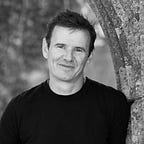The Life That Might Have Been
I spoke with a lady from Germany the other day. She was looking for some clarity, particularly around what might be her next steps. She was 57 years old and had climbed, and summited, the corporate ladder many, many times.
Yes, the money has given her a very comfortable life, but something felt off for her. It was if her well-developed corporate persona did not match who she is inside. Over the last two years, since her daughter left home, she’s been doing some soul-searching.
So I asked her, “Why did you wait so long?
“Out of a sense of responsibility to my daughter,” she replied.
I said, “Could you imagine for a moment, if your daughter didn’t exist, which I know might be horrifying, obviously, but would that sense of responsibility dissipate? Would it disappear?”
“No, no, it wouldn’t,” she answered, quite honestly.
Then she said,” In fact, I feel responsible for my mother as well. And that gives me an extra level of guilt when I contemplate leaving a safe and secure career in the middle of a global pandemic.”
And I said, “Now clearly I appreciate that the global pandemic is real, but if it didn’t exist, would there be another reason for you to feel guilty?”
“Yes,” she answered.
“OK, I said, “then I have one more question. Is your life right now, really that safe and secure? We like to tell ourselves that our careers are safe, our jobs are secure. But often doing something we don’t like is anything but safe. It actually makes us insecure.”
So we had a fantastic conversation. It turns out that this woman is an artist, an emerging writer whom the world is only beginning to recognize. Still, she’s been riddled with self-doubt about it. In fact, she said, “But I’m 57. But I’m 57, But I’m 57” about five times during our chat together.
But, when we took away the reason or the excuse of her daughter, when we took away the reason or the excuse of her mother, when we took away the reason or the excuse of COVID-19, the only thing that remained was a demon of self-doubt she needed to face.
I asked her to reconsider how she looked at the way ahead; to imagine she was standing at a stream. The opposite bank was a distance away, although very much in view. Now, rather than focusing only on the other bank, imagine what the stepping stones might be.
As human beings, we are obsessed with getting to the other bank because we equate it with freedom, an alignment, and a sense of joy. So we visualize it, and we create something that may or may not even be a good reflection of who we are.
We could just as easily say,
“What is the next stepping stone?”
“What is the next thing she could do to bring her artistry to the world?”
She identified what that was almost immediately.
Then I had one final request.
I said, “I am asking you to find the time and the space to go inside and begin to forgive yourself for the fact that you have lived a life out of alignment for so long. It is the first and essential stepping stone in any type of transformation or reimagining.”
I genuinely believe those first tentative steps require us to create a degree of acceptance and self-forgiveness for the person we have been for all this time. Without it, we cannot move forward because the self-doubt and regret will only weigh us down.
It takes enormous courage to reimagine your life at the age of 57, but as I said to the woman from Germany, “if I have half the courage you do at 57, I’d be a happy man. “
Sometimes you have to forgive yourself for yesterday, so you can fully reimagine tomorrow.
My work: Be Brave. You Matter. Click Here.
